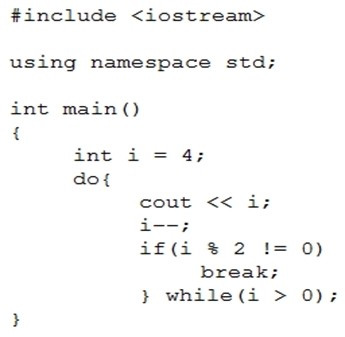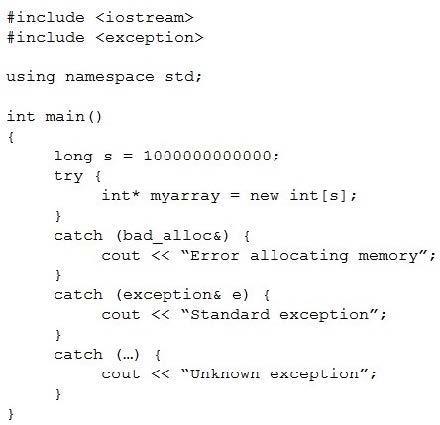Exam Details
Exam Code
:CPA-21-02Exam Name
:CPA - C++ Certified Associate ProgrammerCertification
:C++ Institute CertificationsVendor
:C++ InstituteTotal Questions
:257 Q&AsLast Updated
:Jul 18, 2025
C++ Institute C++ Institute Certifications CPA-21-02 Questions & Answers
-
Question 111:
What is the output of the program if character "1" is supplied as input?
#include
using namespace std;
int main () {
int c;
cin >> c;
try
{
switch (c)
{
case 1:
throw 20;
case 2:
throw 5.2f;
case 3:
throw 'a';
}
}
catch (int e)
{ cout << "int exception. Exception Nr. " << e; }
catch (float e)
{ cout << "float exception. Exception Nr. " << e; }
catch (...)
{ cout << "An exception occurred."; }
return 0;
}
A. It prints: float exception. Exception Nr. 5.2
B. It prints: int exception. Exception Nr. 20
C. It prints: An exception occurred
D. Compilation Error
-
Question 112:
What is the meaning of the following declaration? (Choose two.) char **ptr;
A. ptr is a pointer to a pointer to char
B. ptr is a pointer to char*
C. ptr is a pointer to a pointer to a pointer to char
D. ptr is a pointer to char
-
Question 113:
What is the output of the program?
#include
using namespace std;
class Base {
static int age;
public:
Base () {};
~Base () {};
void setAge(int a=10) {age = a;}
void Print() { cout << age;}
};
int Base::age=0;
int main () {
Base a,*b;
b = new Base();
a.setAge();
b?>setAge(20);
a.Print();
b?>Print();
return 0;
}
A. It prints: 2020
B. It prints: 1020
C. It prints: 20
D. It prints: 10
-
Question 114:
What is the expected result of the following program?

A. It prints: 4
B. The program enters an infinite loop
C. It prints: 42
D. It prints: 420
-
Question 115:
What happens when you attempt to compile and run the following code?
#include
#include
using namespace std;
class complex{
double re;
double im;
public:
complex() : re(1),im(0.4) {}
bool operator==(complex andt);
};
bool complex::operator == (complex andt){
if((this?>re == t.re) andand (this?>im == t.im))
return true;
else
return false;
}
int main(){
complex c1,c2;
if (c1==c2)
cout << "OK";
else {
cout << "ERROR";
}
}
A. It prints: OK
B. It prints: ERROR
C. Compilation error
D. Runtime error.
-
Question 116:
Which code, inserted at line 18, generates the output "AB"
#include
using namespace std;
class A
{
public:
void Print(){ cout<< "A";}
void Print2(){ cout<< "a";}
};
class B:public A
{
public:
void Print(){ cout<< "B";}
void Print2(){ cout<< "b";}
};
int main()
{
B ob2;
//insert code here
ob2.Print();
}
A. ob2?>A::Print();
B. ob2.B::Print();
C. ob2?>B::Print();
D. ob2.A::Print();
-
Question 117:
What will happen if the memory cannot be allocated?

A. The program will print: Standard exception
B. The program will print: Unknown exception
C. The program will cause a compilation error
D. The program will print: Error allocating memory
-
Question 118:
What will happen when you attempt to compile and run the following code?
#include
#include
using namespace std;
int fun(int);
int main()
{
int *x = new int;
*x=10;
cout << fun(*x);
return 0;
}
int fun(int i)
{
return i*i;
}
A. It will print: 100
B. It will print: 101
C. It will print: 10
D. It will print: 1
-
Question 119:
What happens when you attempt to compile and run the following code? #include
using namespace std;
int min(int a, int b);
int main()
{
int b=10;
b = min(5,20);
cout << b;
return 0;
}
int min(int a, int b)
{
if (a
return(a);
else
return(b);
}
A. It prints: 10
B. It prints: 20
C. It prints: 5
D. It prints: 0
-
Question 120:
What happens when you attempt to compile and run the following code?
#include
#include
using namespace std;
class A {
int x;
protected:
int y;
public:
int z;
};
class B : private A {
string name;
public:
void set() {
x = 1;
}
void Print() {
cout << x;
}
};
int main () {
B b;
b.set();
b.Print();
return 0;
}
A. It prints: 123
B. It prints: 1
C. It prints: ?123
D. Compilation error
Tips on How to Prepare for the Exams
Nowadays, the certification exams become more and more important and required by more and more enterprises when applying for a job. But how to prepare for the exam effectively? How to prepare for the exam in a short time with less efforts? How to get a ideal result and how to find the most reliable resources? Here on Vcedump.com, you will find all the answers. Vcedump.com provide not only C++ Institute exam questions, answers and explanations but also complete assistance on your exam preparation and certification application. If you are confused on your CPA-21-02 exam preparations and C++ Institute certification application, do not hesitate to visit our Vcedump.com to find your solutions here.